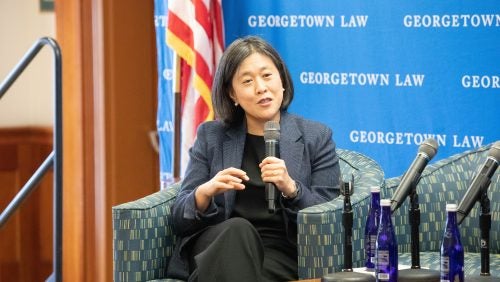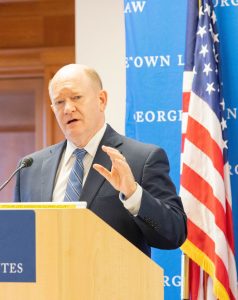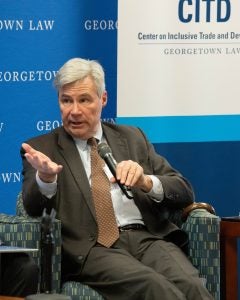Equity, Sustainability in the Spotlight at “Remaking Global Trade” Conference
February 22, 2024

United States Trade Representative Katherine Tai was among the policymakers and experts who attended the "Remaking Global Trade for a Sustainable Future" conference.
United States Trade Representative Katherine Tai and U.S. Senators Chris Coons (D-Del.) and Sheldon Whitehouse (D-R.I.) joined legal experts, policymakers and business and non-profit leaders at Georgetown Law for "Remaking Global Trade for a Sustainable Future," a Feb. 8 conference organized by the Center on Inclusive Trade and Development (CITD), which develops inclusive, sustainable solutions to international trade issues through collaboration among students, scholars and advocates.
During panels such as “Redesigning the Trade System to Support Climate Change Action” and “Leveraging Trade as a Tool for Social Development,” participants discussed the urgency of addressing trade challenges such as climate change and social inclusion. Discussions were guided by the recommendations put forth in a recent report developed by the Remaking Trade for a Sustainable Future project.

In his keynote address, Sen. Chris Coons noted the importance of environmentally and socially conscious trade rules.
The result of a two-year-long effort to which CITD contributed, the report proposes concrete reforms aimed at bolstering sustainability and social equity in trade policy ahead of the World Trade Organization’s Feb. 26-29 ministerial conference, which will gather all member nations to review international trade rules.
Addressing a standing-room only audience, keynote speaker Coons, a member of the Senate Foreign Relations Committee, underscored the need to develop trade policy that is attuned to the realities of emergent technologies such as artificial intelligence and the impact of climate change. “The trade rules of the last three decades are often sharply at odds with the environmental exigencies of today,” he said, noting that decarbonization efforts by the U.S. and its allies have been undercut by competitors who operate without the same environmental safeguards in place. “The world has changed, and … the global rulebook on trade needs to change along with it.”
Socially conscious trade
Coons also discussed the use of U.S. trade policy as a driver of economic and social development abroad, citing his efforts to reinvigorate the African Growth and Opportunity Act (AGOA), which provides 32 African countries with duty-free access to U.S. markets for select goods and is aimed at aligning aid, trade and diplomatic efforts between the U.S. and developing nations. “The global trade system is only sustainable if the Global South — countries in Asia, Africa and Latin America — are benefiting and profiting from further engagement in trade,” he said.
Ambassador Tai spoke in a fireside chat with Remaking Global Trade project Policy Director Jan Yves Remy of the University of the West Indies.
“This conference was an important opportunity to highlight the Biden-Harris Administration’s worker-centered trade policy — collaborating with trading partners to empower workers by defending their rights and raising labor standards, making our supply chains more resilient, protecting our environment and meeting everyday people where they are to incorporate their priorities into our work,” Tai said of the event.
An international law toolkit
In an afternoon address, Dean William M. Treanor noted the ties between Georgetown Law and the trade policy community, including the pioneering work of Professor John Jackson, who created the WTO’s intellectual framework and who led Georgetown Law’s Institute of International Economic Law, where he founded the Journal of International Economic Law (JIEL), a leading publication in the field.

Sen. Sheldon Whitehouse, co-founder and co-chair of the Bicameral Task Force on Climate Change, spoke during a panel on climate change and trade policy.
“Georgetown is a place where law meets policy and where those who want their understanding of the law to help shape the future of our country and our world find a home,” Treanor said. “The urgent task before us all is to take the ideas presented and debated today and turn them into concrete plans of action — both in the immediate and the long term.”
For Nikolai Medish, M.S.F.S.’21, L’25, the conference not only offered the chance to hear trade-policy experts speak candidly about pressing issues in the field — it also offered a bridge between theory and practice.
“Trade policy is one of the most powerful tools in the international law toolkit,” said Medish, who is currently taking part in Georgetown Law’s International Economic Law Practicum, in which student teams research and propose solutions to real legal questions posed by international organizations, government agencies and NGOs.
“It was a special privilege to hear the unique opinions of government officials, trade lawyers, development finance officials and economists in conversation with one another,” Medish said. “I found it fascinating to hear how the speakers’ career backgrounds influenced their problem-solving approaches to developing a more sustainable and equitable trade system.”